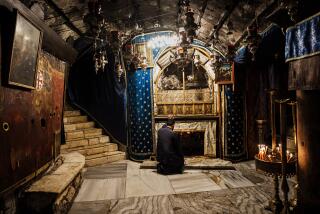A Christian priest faces grim New Year in Iraq
- Share via
Reporting from Baghdad — Father Nadheer Dako started the last day of 2010 with a funeral service for an elderly couple killed by a bomb during a string of attacks against Iraq’s small Christian community.
The previous night, Fawzi Ibrahim, 80, and his 75-year-old wife, Jeanette, had opened their door to find a piece of luggage. When they touched the bag, a hidden bomb exploded. Their house was one of 10 Christian targets hit by militants Thursday night.
Now Dako, who is always ready with a sarcastic barb and a smirk, had to round up enough parishioners to join five relatives for the service at St. George Chaldean Church in Baghdad. It was a cold day with gray skies. Rain pounded the sidewalk and flooded the half-paved streets.
He gathered 20 people and they entered the yellow brick church with its cross standing out among the neighborhood’s Islamic flags.
Dako, 38, is used to living with death. He had become accustomed to danger even before an Oct. 31 siege by Islamic militants at another Baghdad church that left 58 people dead and ushered in a new campaign of attacks against Iraq’s Christian minority.
In 2007, he had played a cat-and-mouse game as he hid from would-be kidnappers who surrounded his church; that same year he narrowly escaped a bomb apparently meant for him.
He had watched too many Christians leave the city for safety elsewhere. But he was not going to let himself fall into depression.
He would scowl and shout from the pulpit and jab the air with his finger. He would smile and indulge in ghoulish humor. Or he would sing.
And on Friday, he would bury a couple, victims of a senseless act of violence, and later in the day would celebrate life again.
“It was a good Santa Claus this year,” he said with a wicked look in his eyes and a sardonic grin after returning home from the funeral.
He quickly veered off into angry screeds against the United States, blaming the 2003 invasion for his country’s woes. He grinned as he said the names of U.S. officials as if speaking four-letter words. He hectored: “Where are you Americans. You promised to bring us good democracy and good government. Where is [former U.S. administrator J. Paul] Bremer?”
At the service for the Ibrahims, he read to the tiny congregation a verse from St. Paul. “God gives us a soul of power and charity, not a soul of fear.”
He had admired the couple; their children had moved years before to the United States and Europe but the Ibrahims refused to leave Iraq. He thought they had been preparing to die. They had readied tombstones months in advance.
As the small group of relatives traveled with the bodies to the cemetery, Dako prepared for his New Year’s service that evening. He sat in his rectory, his collar loosened and a scarf tied tight around his neck, and he thought about what he should say. He made it clear that his group was resilient and would never surrender.
“Jesus asks us not to be afraid, to be a disciple and share the light with the people,” he said.
A baby’s cry came from the next room, where a Christian couple were staying with their child after fleeing from the northern city of Mosul.
Dako changed into a white vestment and stood before a small crowd at 4:30 p.m. The decorations blinked on a white Christmas tree and candles gleamed by the altar. He raised his hands in the air.
“God is the light and peace,” he said. “Protect the dignity of all, Muslims, Christians, Yazidis, Shabak, Sudanis, Pakistanis.”
Some leaned their heads against the wooden benches in thought. For a minute, the power went out and his voice bellowed in the dark.
Later in the evening Dako planned to eat and drink wine with friends. He would call his siblings and mother, who are scattered around the world as a result of the turmoil.
He promised: “Life will continue, and never, never will it stop, even if I die, it will continue. It is God’s will.”
Salman is a Times staff writer.
More to Read
Sign up for Essential California
The most important California stories and recommendations in your inbox every morning.
You may occasionally receive promotional content from the Los Angeles Times.










